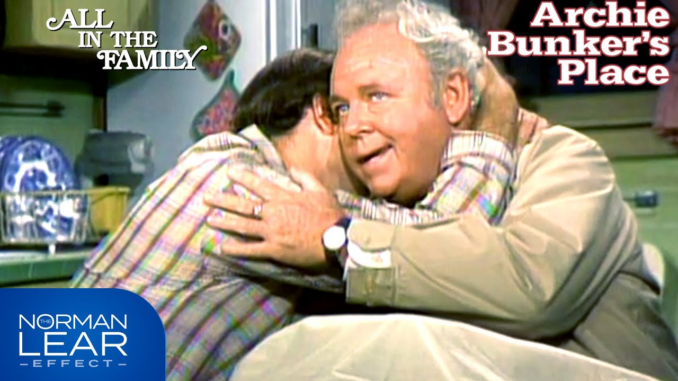
It’s been more than five decades since All in the Family first graced television screens, but its humor still resonates with audiences today. The show, known for its sharp wit and bold character dynamics, has an enduring appeal that goes beyond nostalgia. But what is it about All in the Family‘s humor that makes it so timeless? In this article, we’ll explore the unique comedic magic that made All in the Family a household name.
The Mastery of Character Dynamics
At the core of All in the Family’s humor is its unforgettable characters. The Bunker family—Archie, Edith, Mike (Meathead), and Gloria—formed a dynamic that was both hilarious and often painfully relatable. The genius of the show lay in how these characters, despite their differences, formed a cohesive unit that perfectly blended comedy with social commentary.
Archie Bunker, the working-class patriarch with strong conservative views, served as the show’s comic centerpiece. His quick wit and irreverence created a sharp contrast to the more liberal and progressive characters around him. Mike, the “Meathead,” was Archie’s foil—an intellectual with a rebellious streak who regularly clashed with his father-in-law’s outdated views. Meanwhile, Edith, Archie’s sweet and often naïve wife, provided the perfect foil to his tough-guy persona, offering a soft and humorous balance to his abrasive nature.
The interplay between these characters was the secret to the show’s success. The humor was rooted in the tension between Archie’s bigotry and the more progressive values of his family. Watching these characters engage in heated debates over everything from politics to personal values provided endless opportunities for comedic conflict. Their interactions were both absurd and heartwarming, making them some of the most beloved characters in television history.
A Blend of Dark Humor and Social Commentary
One of the reasons All in the Family stands out is its ability to tackle serious issues with humor. At a time when American television was dominated by safe, family-friendly programming, All in the Family dared to take on taboo subjects like racism, abortion, homosexuality, and political corruption—all while keeping audiences laughing.
Take, for instance, the show’s famous portrayal of racism. Archie’s views on race were outdated, offensive, and often downright painful. Yet, the show used these moments not just to make fun of Archie’s ignorance, but to expose the prejudices lurking beneath the surface of American society. The humor didn’t sugarcoat these issues; instead, it forced viewers to confront them in a way that was accessible and thought-provoking.
In one of the show’s most memorable moments, Archie’s racist remarks about African Americans are met not with anger, but with ridicule from his more enlightened family members. The humor here is not in agreeing with Archie’s views but in highlighting how ridiculous and outdated they are. This comedic approach made serious issues more palatable for audiences while encouraging them to examine their own biases.
The Perfect Timing of the Cast
Another key to the show’s humor was the impeccable timing of the cast. Carroll O’Connor’s portrayal of Archie was nothing short of legendary. His delivery of sarcastic remarks and biting one-liners became some of the most iconic moments in TV history. His ability to inject humor into even the most serious situations made Archie both infuriating and lovable at the same time.
Jean Stapleton, who played Edith, brought a sweetness and naïveté to the role that made her interactions with Archie all the more comedic. Her deadpan responses to his rants and her obliviousness to his faults created a perfect comic balance.
Rob Reiner, as Mike, and Sally Struthers, as Gloria, brought youthful energy to the show. Their performances often acted as the catalyst for the debates that shaped the show’s humor, particularly the clashes between Mike and Archie. Together, the ensemble cast brought a depth to the show that made it both funny and socially relevant.
Conclusion
The humor of All in the Family is as timeless as the issues it tackled. Its boldness in addressing serious subjects with humor, its brilliant character dynamics, and the perfect comedic timing of the cast all contributed to its lasting legacy. Today, All in the Family remains one of the most beloved sitcoms in television history—not just because of its humor, but because of its ability to make audiences think while making them laugh.
